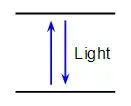Suppose we look at the twin paradox where the twin traveling at high speed relative to an observer on earth has a clock which counts time by sending photons of light across a distance within the spaceship (perpendicular to the direction of motion) to a detector which counts off 'time' as the interval between photon detections. If the speed of light is constant in both frames, and the distance the photon travels is equal in both frames (no length contraction in the perpendicular direction), won't both observers say the same amount of time has passed in both frames at a later time (suppose the observer on earth uses an identical clock)? Wouldn't a difference in observed time intervals imply differences in the speed of light?
Asked
Active
Viewed 454 times
1 Answers
11
The distance the light travels isn't the same in both frames. In the ship frame it looks like:

And as viewed from Earth the path of the light looks like:

So as viewed from Earth the light travels farther than it does when view on the ship. Since $c$ is a constant the interpretation of this is that time is running slowly on the ship.
John Rennie
- 367,598